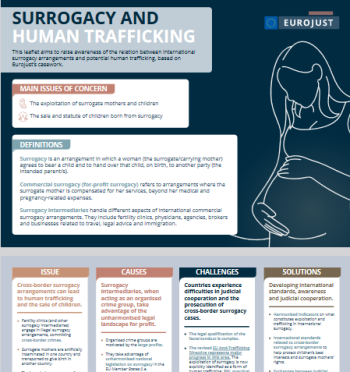
Cross-border surrogacy arrangements, where a woman agrees to bear a child and to hand it over, on birth, to another party, can lead to human trafficking and the sale of children.
Organised crime groups take advantage of the unharmonised national legislation on surrogacy in the EU Member States. Depending on the country, surrogacy is either allowed, prohibited, or not regulated. The revised EU Anti-Trafficking Directive represents major progress in this area, as the exploitation of surrogacy is now explicitly identified as a form of human trafficking. Still, some practical challenges remain.
Based on Eurojust’s casework, this leaflet aims to raise awareness of the relation between international surrogacy arrangements and potential human trafficking. It highlights the difficulties faced by the national authorities and possible solutions to the main legal challenges.
